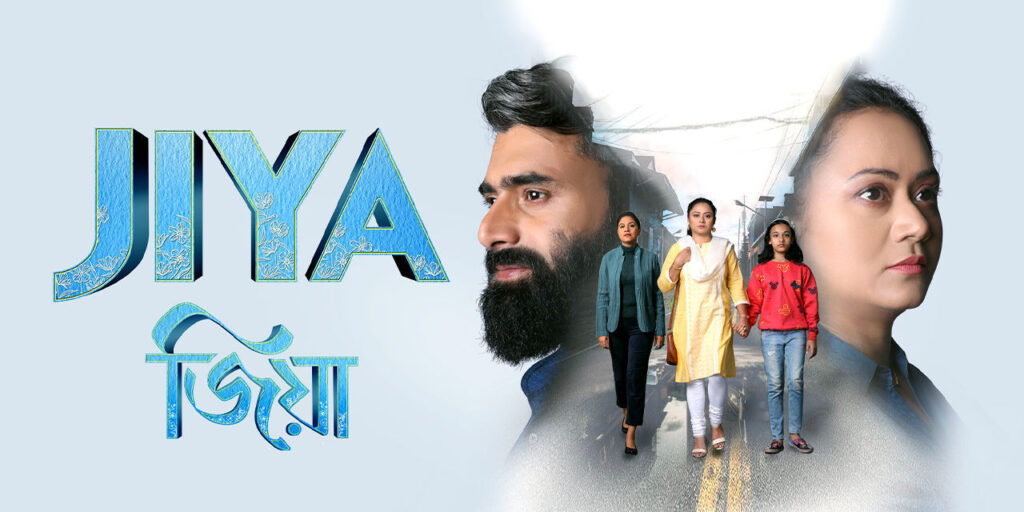With Jiya, Kenny Basumatary veers away from his action/comic trademark and attempts to tackle a serious social drama that depicts the endless battle of a woman with a society entrenched in sexism, prejudice, and patriarchy. Aided by a great act by Sarmistha Chakravorty in the title role, the film has its share of highs but ultimately ends up as one that could have delivered so much more.
The film looks at the life of Jiya (Chakravorty), recently divorced from her abusive and cheating husband. She stays with their daughter, Nupur (Aradhya Mahanta), in a rented house and works in an office. Her mother (Mala Goswami), unable to cope with the judgmental attitudes of society, keeps pressurizing Jiya to remarry. Life at work is no better. Though her boss (Podmarag Goswami) is appreciative of her efforts, he harbors dubious intentions towards her. Amid all this, Jiya finds comfort in the company of her friend and soul-mate, Pallavi (Eepsita Hazarika). One day, Jiya’s boss crosses the line of decency with her and in a fit of rage, she slaps him and resigns from her job. She shifts to a new rented place while Pallavi gets her a job at her office. There, she introduces Jiya to her colleague, Abhi (Reeky Sharma), a well-mannered and courteous gentleman. As the days pass, Jiya and Abhi become close to one another. Abhi decides to marry Jiya. All looks well on the surface but…
Basumatary, with a decade-long career as a filmmaker, has developed a formidable reputation as an entertaining filmmaker who also knows how to tickle the viewer’s funny bone. Jiya sees him in new territory. Basumatary, who has the screenplay co-written with Sarmistha Chakravorty, also the producer, navigates the world of female desire and bonding with gentleness. The affection shared between Jiya and Pallavi is one of the strongest tracks of the film and is depicted with sensitivity and grace. But the narrative gets derailed by the screenplay’s obsession with amplified sentimentality and its repetitive commentary on the struggles of a single mother, who must wrest and secure her rightful and respectful place in society.
It doesn’t help that the film loses all nuance in portraying the men within highly stereotypical parameters. They are all cheaters or are lustful, violent or unsympathetic. Her husband, despite being involved with another woman, got married to her and nonchalantly continued with his extramarital affair. Her boss tries to take advantage of her being a single woman and though Abhi confesses to Jiya that he becomes a violent person when he gets drunk, that does not make him any less culpable. In fact, the two pivotal scenes where Abhi gets plastered lack the required tension while their treatment is overly limp. His proposal to marry Jiya in front of Nupur and Pallavi comes without any proper emotional build-up and feels staged rather than natural. When his parents discover his affair with Jiya, the altercation that follows is soapy and comes off as forced and clunky. These are some of the significant obstacles that prevent the film from achieving its intended impact.
What really lifts the film is Sarmistha Chakravorty’s portrayal of Jiya. It is an astonishingly honest performance as she perfectly captures every shade and nuance of her character. The supporting acts are so-so at best. Eepsita Hazarika gives Pallavi a charming presence as she provides a tall pillar of support for her friend. Sadly, her character appears under-utilized and the film could have done more with her. Reeky Sharma is restrained, no doubt, but as the narrative progresses, he falters in his performance, failing to be the perfect foil for Jiya.
In terms of technicalities, the cinematography by Suraj Deka is adequate enough. The editing by Raktim Ranjan Basumatary faces challenges in engagement, struggling to maintain an overall rhythm and pace because of the lengthy script, which could have done with major trimming at the writing stage itself. The background score by Ambar Das is pleasing and harmonious and supports the film well enough.
Jiya no doubt gets a big boost due to Sarmistha Chakravorty’s strong central performance. However, it finally ends up as not quite fulfilling its potential, its genuine intentions notwithstanding.
Assamese, Drama, Color


